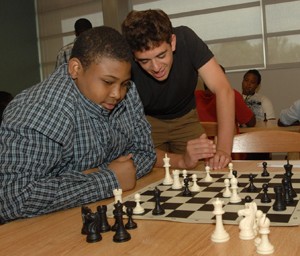
School-university partnerships naturally develop around academic programs — and the partnership between University City’s Brittany Woods Middle School and Washington University in St. Louis is no exception.
However, as the Brittany Woods-WUSTL partnership develops, programs that address students’ values, motivation and attitudes are joining those that focus on academic subjects. Schools that combine academics with programs that support social development and healthy families are called community schools.
Mostly in urban areas, these schools also have characteristics of community centers and health clinics. They provide services that wrap around families and reach all stages of life, not just children and adolescents.
Brittany Woods principal Jamie Jordan and other staff members meet regularly with faculty and staff from WUSTL on a committee called “Elev8.” Jordan explains that her priority is success for all students, and that means a broader focus than academics.
“We’re interested in helping students make healthy, safe choices,” Jordan says, “because that affects their ability to succeed in school and in life.”
The Elev8 team has initiated several projects, including placement of practicum students from WUSTL’s Brown School at Brittany Woods. Andrea Holmes, science educator, worked with WUSTL’s K-12 Connections program to identify undergraduates who could lead weekly after-school activities for Brittany students.
Benefits of after-school activities include academic achievement, as well as development of initiative and confidence in tackling challenges. The Elev8 committee decided that beginning after-school programs could be a positive factor in students’ lives.
“When we began to envision these clubs, we immediately thought of the Ervin Scholars and their mission of community service,” Holmes says. “We approached Michael Dango in K-12 Connections, and he helped us get this group involved at Brittany.”
After-school clubs began at Brittany in spring 2011, including chess, poetry, technology, dance and a homework cafe, where WUSTL students and teachers provide guidance on school assignments.
Tarik Cole, an eighth-grade student, says he got involved in the chess club to fill the time after school, and became hooked. He cheerfully accepts being beaten by Alijah Welson, a fellow eighth grade student, and says it is a learning experience.
“I like the mind aspect of it,” Cole says.
Jacob Zax, a sophomore in Arts & Sciences, circulates among players and offers pointers. He ranks chess pieces with monetary values, he explains, to help students understand the value of each piece and how powerfully it can move across the board.
“This is a ton of fun for them and me; and it gets me off campus,” Zax says. “I want to support love of the game for kids who might not have the opportunity, and to show them that older kids play, too. People can be passionate about chess, and that can carry them throughout life,” he says.
Zax says he became intrigued by the giant chess set at his primary school, played with his father, and worked up to tournaments. His passion for the game led him to become president of the WUSTL chess club, where he unwinds after his political science studies.
Asha Thomas, an Ervin Scholar and freshman psychology major in Arts & Sciences, leads a group of poetry readers and writers at Brittany. Students in the Ervin Scholars Program earn scholarships based on their engagement in community service.
“We realigned our initiatives to include urban community service. I love to write poetry,” Thomas says. “I was nervous the first day, but getting to know the kids has been wonderful. I’ve been impressed with their sophisticated expression. I don’t think I was writing this well in middle school!”
As the partnership continues to engage the community, University City parents also have gotten involved.
Derek Mills, father of a seventh-grade student, helps coach chess club members on his day off. Mills has first-hand knowledge of the cognitive benefits of playing chess.
He was the first chess teacher for his son Derek, who now a seventh-grade club member.